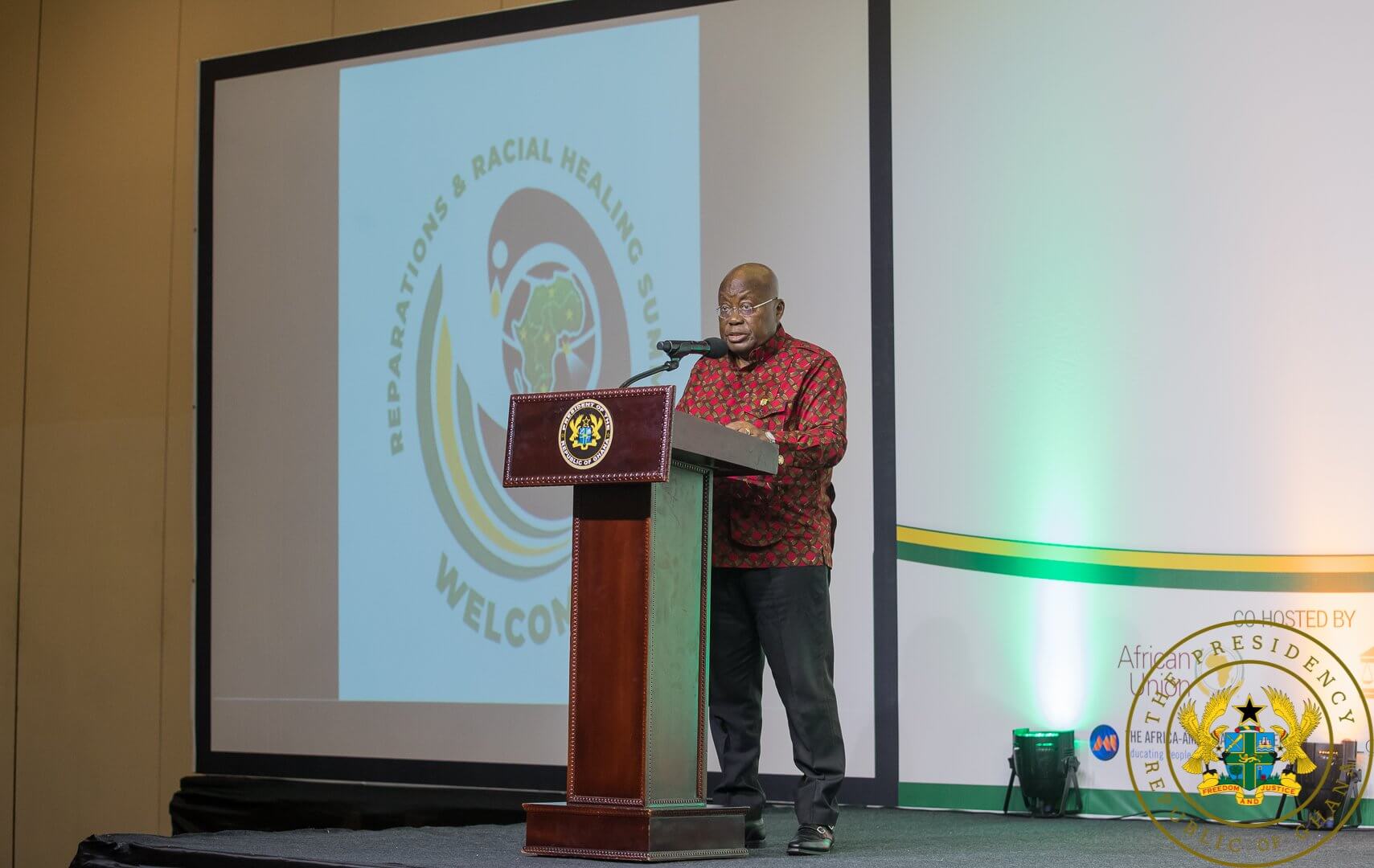Ghanian President Nana Akufo-Addo on Monday said that a “formal apology” and reparations for Africans historically enslaved by European nations are “long overdue,” and called on the African Union (AU) to present a united front in advancing the cause of “justice” through reparations.
Speaking at the Reparations and Racial Healing Summit in Accra, Akufo-Addo stressed that the era of slavery was “devastating to the African continent and to the African diaspora,” and had stifled the continent’s “economic, cultural, and psychological progress.”
In this respect, he expressed regret over the “crimes and damage it (slave trade) has caused to the population, psyche, image, and character of Africans the world over” and stated that Africa deserves a “formal apology” from European nations.
It is now time to revive and intensify the discussions about reparations for Africa. Indeed, the time is long overdue.
— Nana Akufo-Addo (@NAkufoAddo) August 2, 2022
He claimed that 20 million Africans who were sold off as slaves are entitled to reparations, denouncing that such a demand only “becomes a debate” when it pertains to Africa and Africans.
He questioned the double standards in the discourse, highlighting that when the British declared an end to slavery and colonisation, all slaveholders received damage settlements equivalent to £20 billion ($24.3 million) today, while the slaves themselves “did not receive a penny.” He pointed to similar examples in the United States and in Haiti in 1825.
The Ghanaian president posited that this is in sharp contrast to the continued reparations for Japanese-American families who were incarcerated in internment camps in America during World War II and Jewish people subjected to abuses during the Holocaust. Keeping this in mind, Akufo-Addo reaffirmed that “it is time for Africa also to receive reparations.”
— Nana Akufo-Addo (@NAkufoAddo) August 2, 2022
In the same vein, he urged the AU to engage with “our kith and kin from the diaspora” to unify in seeking damages for the 400-years long transatlantic slave trade. To this end, he lauded the efforts of the eight-member CARICOM (The Caribbean Community and Common Market) in igniting the debate for reparations from colonial powers.
Back in 2020, CARICOM member states, led by Barbados Prime Minister Mia Mottley, came together to demand reparations from European and North American nations for the damages they inflicted through the historical practices of slave trade and racism. They emphasised that centuries of systemic oppression are responsible for intergenerational trauma and diseases among their people.
Mottley noted that slavery reparations need not be financial but could be centred around the theme of ‘justice’ in general.
Similarly, Akufo-Addo asserted that the “discourse on reparations cannot succeed without emphasis on racial healing,” cautioning that no amount of money can restore the dignity of the enslaved Africans.
— Nana Akufo-Addo (@NAkufoAddo) August 2, 2022
He thus urged the participants at the Accra Summit to not “overly concern themselves with modalities for the payment of reparations” but rather to seek true “justice” and “heal from the wrongs of the past in order to capitalise on the opportunities that await us in the future.”
In this respect, the four-day Summit, which was co-hosted by the AU Commission, the African Transitional Justice Legacy Fund, the African-American Institute and the Global Black, funded by the MacArthur Foundation, brings together all of Africa with the aim of shaping a comprehensive strategy and dialogue mechanism to chart a transcontinental plan to facilitate reparations and formulate new approaches to racial communal healing for Africans.
Calls for reparations from previous colonies have been gaining steam in recent years.
Ghana's President calls for reparations for slavery- interesting to see a vital issue being raised by a Western ally but the timing is interesting here. https://t.co/f9FSIJO6RP
— Mucahid Durmaz (@MucahidDurmaz) August 2, 2022
Likewise, during a visit to the Democratic Republic of Congo in June, Belgian King King Philippe reiterated his “deepest regrets” over the brutal colonisation of the country during the late 19th and 20th centuries but once again stopped short of apologising, fearing that this may form the grounds for legal claims to compensation.
Similar demands were made during Prince William and Duchess Kate’s Caribbean tour earlier this year.
Critics of Akufo-Addo, however, argue that his attempts to join this chorus are driven by a desire to deflect attention from the west African nation’s economic struggles, with inflation touching 30% and citizens holding repeated protests over his governance. In fact, the economic crisis has even forced Ghana to knock at the doors of the International Monetary Fund.

